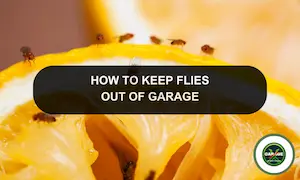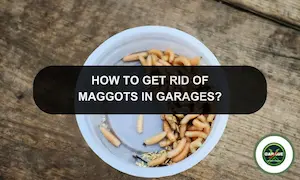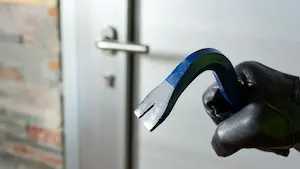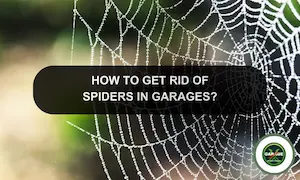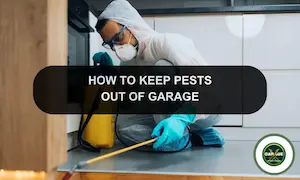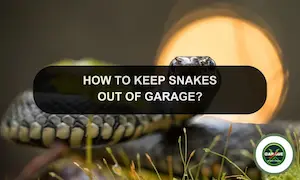How To Get Rid Of Mosquitoes In Garage: Keeping Mosquitoes Out
This post contains affiliate links.
This post contains affiliate links.

Mosquitoes may seem like a mere nuisance, but their presence can be more problematic, especially when they decide to make your garage their favorite hangout. How to get rid of mosquitoes in the garage?
To get rid of mosquitoes in the garage:
- Remove standing water.
- Use mosquito traps.
- Install door screens.
- Apply natural repellents like citronella.
- Encourage natural predators (birds, bats).
- Use fans for air circulation.
- Keep the garage tidy and clutter-free.
- Use chemical repellents and insecticides if necessary.
In this post, we explore why these fliers love to hang around your garage before discussing how to remove them.
Why Mosquitoes Love To Be In Garage
Mosquitoes are drawn to garages for several reasons, often linked to the environment these spaces provide.
Standing Water
Garages often accumulate standing water, whether from:
- leaky pipes,
- spilled containers or
- water that’s been tracked in by cars after a rainstorm.
This creates an ideal breeding ground for mosquitoes, as female mosquitoes lay their eggs in water, where the larvae develop.
Shelter
Another factor is the sheltered environment garages offer. Mosquitoes prefer damp, dark places to rest during the day, and the typical garage provides just that.
With its often humid atmosphere and lack of natural predators, a garage can become a haven for these biting insects. Regularly airing out your space and using fans can help deter these pests.

Attractants & Carbon Dioxide
Carbon dioxide and other attractants, like certain chemicals and scents, can draw mosquitoes into your garage. When you open the garage door, these cues can lead mosquitoes inside.
Using door screens or making sure doors are promptly closed can significantly reduce the number of mosquitoes that find their way into your garage.
Your Garage Is Around Outdoor Mosquito Attractions
Lastly, the vicinity of your garage to other mosquito attractions, such as gardens with water features or unclean gutters, can increase the mosquito population near your garage.
Ensuring these areas are clean and free from standing water can help control the mosquito problem around your home.
Types Of Common Mosquitoes In Garage
Mosquitoes find garages appealing, from the shelter they provide to the standing water that might accumulate in an old bucket or a forgotten cup. But not all mosquitoes are the same.
Let’s look into the types that might be buzzing around your garage.
Aedes
The Aedes mosquito is known for its daytime feeding habits. These pests are not just annoying but also carriers of serious diseases.
If you notice mosquitoes with distinctive white markings on their legs and a way of holding their body parallel to the surface, you’ve got Aedes.
They love breeding in the small amounts of water that can collect in a forgotten flowerpot saucer or a tire leaning against the garage wall.

Anoplehes
Then there’s the Anopheles, the infamous spreader of malaria. While less common in some areas, they’re attracted to the cooler, damp environments garages offer.
They prefer to lay their eggs in clean, unpolluted water, so unused water features near your garage could be a potential breeding ground.
Culex
Culex mosquitoes are the common culprits behind the West Nile virus. These pests prefer to attack at dusk and dawn. They’re not picky about where they breed, so any stagnant water in or near your garage could be hosting a Culex nursery.
Culiseta
The Culiseta mosquitoes, larger than their cousins, are also drawn to the sheltered environments garages provide. They can endure colder temperatures, making them a year-round problem in some regions.
Psorophora
Psorophora mosquitoes are aggressive biters, and while they’re less likely to spread diseases, their bites are notably more painful. They’re drawn to the same conditions as their relatives: standing water and shelter.
Dangers Of Mosquitoes – Why You Need To Repel Them
Mosquitoes are more than just an annoyance; they pose real dangers to human health. Their capacity to spread diseases, disrupt comfort, and contribute to allergic reactions makes them a significant concern.
Carriers Of Diseases
Mosquitoes are notorious carriers of diseases. They can transmit serious illnesses such as:
- Malaria,
- Dengue fever,
- Zika virus, and
- West Nile virus.
These diseases can have devastating effects on communities, leading to high fever, severe headaches, and, in extreme cases, death. The Centers for Disease Control and Prevention regularly issues guidelines on preventing mosquito bites, especially in areas prone to outbreaks.
Lowers Quality Of Life
The mere presence of mosquitoes can severely impact the quality of life. Their buzzing and biting disrupt sleep and outdoor activities.
In areas with a high mosquito population, the constant threat of bites can deter people from enjoying their:
- yards,
- parks, and
- other outdoor spaces.
Can Cause Allergic Reactions
Mosquito bites can cause allergic reactions in some individuals. These reactions range from mild irritation and itching to more severe responses such as hives or swelling.
While not as life-threatening as disease transmission, allergic reactions to mosquito bites can significantly affect a person’s daily life.
How To Know When You Have a Mosquito Infestation
Recognizing a mosquito infestation early can save you a lot of itches and potential health risks. Here are seven signs that indicate you might be dealing with more than just a few pesky mosquitoes.
Increased Biting Activity
One of the most obvious signs of an infestation is an uptick in mosquito bites. If you notice you’re getting bitten more often, especially indoors or in your yard, it’s time to investigate.
Mosquitoes are attracted to carbon dioxide and body heat, making humans prime targets.
Buzzing Sounds
That distinctive high-pitched whine of a mosquito’s wings can be more than just an annoyance; it can signal an infestation.
If you hear buzzing more frequently, especially in areas like your garage or near water features in your yard, take it as a warning.
Water Sources
Mosquitoes lay their eggs in standing water. Inspect your property for sources of standing water, such as:
- clogged gutters,
- water features, and
- small containers or toys left outside.
A significant increase in these potential breeding sites can lead to a mosquito population boom.
Swarms
Seeing swarms of mosquitoes is a clear sign of infestation. These swarms often occur near breeding sites.
If you notice groups of mosquitoes flying together, especially around dusk or dawn, it’s time for mosquito control measures.
Larvae in Water
Inspecting standing water around your home can reveal mosquito larvae, which look like tiny wriggling creatures.
Finding larvae indicates that mosquitoes are breeding nearby, and it’s crucial to eliminate these water sources to prevent more mosquitoes from maturing.

Increased Use of Repellents and Traps
If you reach for the bug spray or set up more mosquito traps than usual, it’s likely due to increased mosquito activity. While repellents and traps can help, they also indicate that the mosquito problem may be more significant than usual.
Presence in Unusual Areas
Mosquitoes typically prefer outdoor environments, but if you start noticing them indoors frequently, it could indicate an infestation. They can enter through open doors, windows, or even tiny cracks and crevices in your home’s exterior.
How To Get Rid Of Mosquitoes In Garage
| Strategy | Notes |
| Remove Standing Water | Empty and clean any containers or areas with standing water in and around the garage. |
| Use Mosquito Traps | Set traps that lure and catch mosquitoes inside or near the garage entrance. |
| Install Door Screens | Put up screens on the garage door to keep out mosquitoes while letting air in. |
| Apply Natural Mosquito Repellents | Use citronella candles or oils in the garage area to repel mosquitoes. |
| Encourage Natural Predators | Attract birds and bats that eat mosquitoes by installing bat houses or planting certain vegetation. |
| Use Fans | Use powerful fans to disrupt mosquito flight and cool the garage. |
| Keep the Garage Tidy | Regularly clean and declutter the garage to eliminate mosquito hiding spots. |
| Chemical Repellents and Insecticides | Use sprays and insecticides according to instructions for tough infestations, or consider pest control. |
Battling mosquitoes in your garage can feel like an endless summer chore. These pests bring the annoyance of itchy bites and pose health risks. Fortunately, there are effective strategies to reduce their presence and keep your garage mosquito-free.
Remove Standing Water
The first step in mosquito control is removing their breeding grounds. Mosquitoes need as little as one inch of water to lay their eggs. Check your garage and its surroundings for any source of standing water.
This includes old buckets, drains, unused flowerpots, and even small puddles that can form inside or near your garage. Regularly empty and clean these items to prevent mosquitoes from laying eggs.
Use Mosquito Traps
Modern technology offers several effective mosquito traps.(paid link) These devices lure mosquitoes by mimicking human breath or using UV light. Once attracted, mosquitoes are trapped and eventually die.
Placing a mosquito trap inside your garage or near its entrance can significantly reduce the mosquito population.
Install Door Screens
Consider installing a screen if you often leave the garage door open for ventilation. This allows air to circulate while keeping mosquitoes and other flying insects out.
Various options exist, from magnetic screens that can be easily installed and removed to more permanent fixtures.
Apply Natural Mosquito Repellents
Natural repellents(paid link) like citronella can deter mosquitoes. Citronella candles or oils can create a mosquito-repellent ambiance.
However, their effectiveness is limited to where they’re placed so that you may need several around your garage.

Encourage Natural Predators
Encouraging the presence of mosquito predators like birds, bats, and certain insects can help control their population.
Installing a bat house near your garage or planting vegetation that attracts insect-eating birds can provide a natural solution to your mosquito problem.
Use Fans
Mosquitoes are weak fliers. Placing a high-velocity fan in your garage can create challenging wind conditions for mosquitoes. This simple solution not only cools down the space but also keeps mosquitoes at bay.
Keep the Garage Tidy
Mosquitoes seek shelter in dark, cluttered spaces. Keeping your garage clean and organized reduces hiding spots for adult mosquitoes. Regularly sweeping and decluttering can make your garage less appealing to them.
Chemical Repellents and Insecticides
When natural methods aren’t enough, chemical repellents(paid link) and insecticides (paid link) can be effective.
Use mosquito sprays carefully, following the product instructions to avoid harm to humans, pets, and beneficial insects. For severe infestations, professional pest control services can offer more potent solutions.
Mosquito Control – Prevent Mosquitoes From Entering Your Garage
Implementing these strategies requires effort and vigilance, but the payoff is a more comfortable and safer environment in and around your garage.
Remember, consistency is key in mosquito control. Regular checks for standing water and the strategic use of traps and repellents can keep mosquito populations under control.
With these measures, you can enjoy a summer free from the buzz and bite of unwanted garage guests.
Check out comprehensive guides on how to get rid of other garage pests here!

